Introducing RELAAACs: Rubric for Evaluating the Language of Apps for AAC
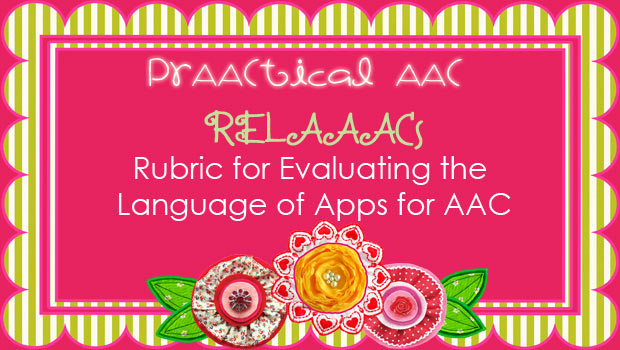
It is not the strongest of the species that survive, nor the most intelligent, but the one most responsive to change. Charles Darwin
–
SLPs everywhere are struggling with the game-changing explosion of AAC apps on mobile devices. We’ve mentioned our own internal conflict in previous posts and continue to mull over how best to integrate this into our work as clinical educators without jeopardizing the assessment and intervention principles that have served us so well over the years. We’ve really appreciated the fine work of professionals such as Jessica Gosnell at Boston Children’s Hospital, Scott Marfilius, and Kelly Fonner, and have put their feature match checklists to good use. As we did, we found that we wanted a more systematic way to consider the language and communication of the AAC apps that we were learning about.
–
This post introduces you to an early draft of RELAAACs: Rubric for Evaluating the Language of Apps for AAC (Link to 2015 updated form). This rubric is designed to help SLP compare the communication and language features of AAC apps. It is meant to be used in conjunction with (not instead of) more comprehensive checklists that address a variety of app features, such as those developed by Gosnell (2011) and Marfilius and Fonner (2012).
–
When this comparison is being done in order to select an AAC app for an individual with significant communication difficulties, the RELAAACs rubric should be used in the context of a comprehensive AAC evaluation. Of course, that process should consider a range of aided and unaided strategies and tools using the feature match and other established assessment practices. You can view RELAAACs here (link to 2015 version).
–
We welcome your feedback, either here or off-line.
–
–
Special thanks to the participants of the Florida DOE Weekend With the Experts workshop series who provided feedback on our initial draft.
–
Filed under: PrAACtical Thinking
Tagged With: Apps, assessment, feature match, rubric
This post was written by Carole Zangari

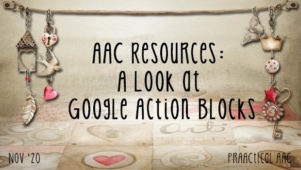
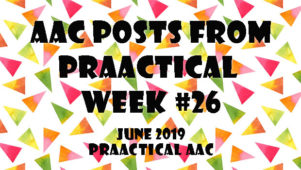
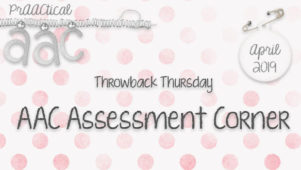
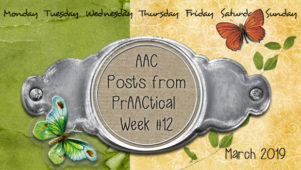
13 Comments
I am presenting a paper about app trials tomorrow at the Speech Pathology Australia conference and have mentioned Vincent’s educat rubrics, Fonner, Gosnell and Jane Farell’s work saying we need a better easier way to evaluate. From a quick initial look this looks great! Thanks, I will be adding in mention of this in my talk and look forward to examining it in depth.
Felicity, thanks for the comment and for sharing this early draft at your presentation. We’d appreciate any feedback along with other tools or ideas that you have found to be helpful. Thanks again and good luck with the presentation tomorrow!
You may want to consider adding information regarding the availability of support for queries. Many apps simply have an e-mail, some not even that, and if an individual is charging money for a purported “solution,” there needs to be some level of accountability. Being able to evaluate some of the internal features of an app is important, but very few AAC users are able to learn to use a system effectively based on a “dump and run” approach to intervention.
Russell, that is so very true and something that clinicians often don’t think about until after the fact. In this rubric, we tried to stick to the language and communication aspects of apps as opposed to a broader view of the features. Initially, the availability of support seemed to come under the latter but your point is a very good one. If someone can’t get help modifying the vocabulary organization, for example, then that is a big drawback that should be considered. Thanks for the feedback. Gives us another perspective to ponder…
How can I review the rubric? Txs
Sue, you can just download it from our eToolbox and try it out. Let us know what you think, okay? We would love any feedback.
Hey Carole — I’m trying to get to your RELAACS rubric and keep getting an error message. Have you taken it off-line?? Is there still a way to download it?
Thanks (and hope all is well with you!)……………….Julie
Hi Julie! Not sure what went wrong with that but I fixed it. Let me know if you have any more issues, okay? Hope all is well with you, too!!
Is there a “final” version of the rubric posted somewhere? I love it and would really like to use it but having “draft” written across it makes it a little difficult.
Thank you.
Has this “draft” document from 2012 been updated and if so, where can it be found? Thanks!!
Ann, this post links to the final version: http://praacticalaac.org/praactical/praactical-resources-comparing-aac-apps/. Hope you find it useful.
Thanks so much Jane! Yes, we would love any feedback to add to our next update.